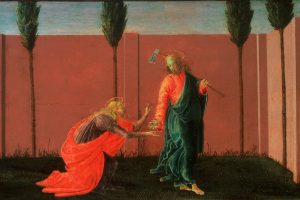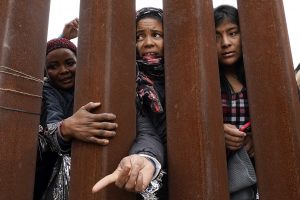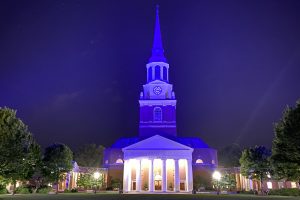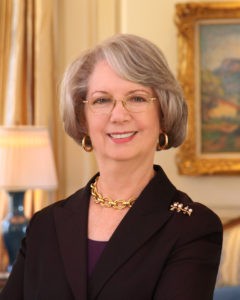 Three years ago, I wrestled with the news that my great-grandmother’s statue memorializing “Uncle Jeff” had been removed by the City of New Orleans from the site where it had stood on Canal Street since 1911.
Three years ago, I wrestled with the news that my great-grandmother’s statue memorializing “Uncle Jeff” had been removed by the City of New Orleans from the site where it had stood on Canal Street since 1911.
I know it really wasn’t Grandma Lucy’s statue, and Jefferson Davis wasn’t her biological uncle, but that was part of our family story — a story embellished and distorted and romanticized by women like Lucy Roberts as they created and passed on the myth of the “Lost Cause.”
Was history erased when Davis’ statue came down? No, that was done long ago by those genteel ladies of the monument societies and the United Daughters of the Confederacy, as they quite literally rewrote the history of the South — a revisionist history that was taught in Southern schools, our homes and even our churches through much of the 20th century. It so completely permeated Southern culture — all those romantic novels that glorified life on the plantation before the Civil War by authors like Margaret Mitchell, Frances Parkinson Keyes and Harnett Kane; children’s stories like Uncle Remus and Little Black Sambo; music ranging from the songs of Stephen Collins Foster to “Dixie”; minstrel shows and Al Jolson in blackface; the comedy routines of Amos and Andy. Did anyone raise their voice in protest?
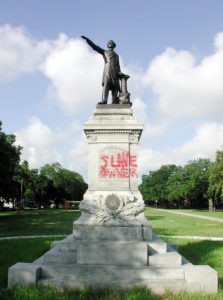
A vandalized Jefferson Davis statue in New Orleans before its removal. Photo by Bart Everson. Used by Creative Commons license.
How many people thought twice about separate water fountains and restrooms, Blacks in the back of the buses and streetcars, schools that were separate but in no way equal? Segregation was all we knew.
No wonder then that so many Southerners cling to the myths. When I recently challenged a friend’s position, she exclaimed in some distress, “You are asking me to reject everything my parents taught me, everything I learned in school and at church.”
That moment came early to me. Actually, a series of transformational moments.
In 1957, I was a junior in high school in Texarkana, Ark., when President Eisenhower sent in troops to integrate Little Rock Central High School, 150 miles up the road. White families in Little Rock sent their children to friends and relatives in Texarkana to attend school, while boys who had joined the National Guard were called out of class to join the troops in Little Rock.
The next summer, our school band was named the official Arkansas band to march in the International Lion’s Club parade in Chicago. On the drive up, we stopped in Little Rock to have our picture taken on the Capitol steps. Some of the boys bought Arkansas state flags and attached them to the sides of the buses. When one of the buses broke down outside Chicago, mechanics refused to repair it because of the Arkansas flag. We were viewed as racists, a new experience for all of us, a rude introduction to a different point of view and to the importance of symbols.
That fall my best friend came home from college completely disillusioned. In only a few months of history classes at nearby Ouachita Baptist College — hardly a bastion of liberalism — she had learned that almost everything she had been taught growing up was a lie. The discovery shook her faith. Whom could she believe?
A year later, I attended a Baptist Student Union retreat for Baylor freshmen at an encampment near Waco. The main speakers were two young BSU summer missionaries: Dan Pratt, a Baylor music major, and Bill Lawson, a young Black preacher who would soon become BSU director at Texas Southern University and would go on to be one of the great pastors and civil rights activists in Houston. At age 92 he spoke recently at George Floyd’s funeral.
Lawson’s presence at the retreat — the first time I ever encountered an African American in other than a service position — changed my life. Baylor professors in history, journalism, sociology and philosophy helped me to see the South more realistically. Missionaries to Africa talked about the young men they led to Christ who wanted to study for the ministry. The missionaries had to say: “I’m sorry. You can’t attend my university. It doesn’t accept Black students.” By my sophomore year, I had shed Lost Cause history.
When I was elected editor of The Lariat, the Baylor student newspaper, I was summoned to the office of President Abner McCall. The former dean of the law school explained the First Amendment to me: freedom of the press belonged to the publisher, not to those who worked there; therefore, I was forbidden to run any stories about integration.
It was awfully hard not to write about integration and civil rights in 1962.
In Austin, University of Texas students were participating in sit-ins at movie theaters. Black churches were burning. A Lariat reporter and photographer drove all night to Oxford, Miss., to cover the enrollment of James Meredith at Ole Miss. The Faculty Senate, Student Congress and The Lariat all called for the integration of the university. A year later, the Baylor Board of Trustees voted to admit Black students. Robert Gilbert and Barbara Walker enrolled at Baylor in fall 1964 and three years later became Baylor’s first Black graduates.
We were so naïve and idealistic. We expected an immediate kumbaya moment when all students would embrace one another and students of color would be welcomed to full participation in all the activities and clubs. We have waited far too long.
Now Baylor, through the recent action of the Board of Regents, joins the call for truth, justice and reconciliation. Finally.
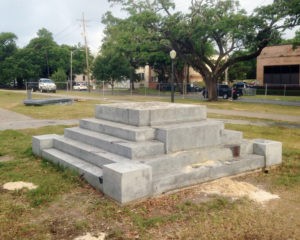
The base of the Jefferson Davis statue in New Orleans after the statue was removed. Photo by Bart Everson. Used by Creative Commons license.
After Davis’ statue came down and it was obvious that it was only one of many Confederate monuments to fall, I wished that it had been the carefully planned work of historians, rather than the expedient action of politicians. The stories the statues tell need to be rewritten factually, in context, not erased. Perhaps Baylor, along with other institutions that proactively acknowledge their history, will have the opportunity to rewrite it fully and accurately before someone else rewrites it for them.
I, like so many other Southerners, had to come to grips with my family story before I could accept a new story of the South and of the nation. Grandma Lucy’s mother had been married previously to Jefferson Davis’ brother. Her uncle’s wife was Davis’ sister and Lucy’s godmother. An 1898 newspaper story announced the formation of the Jefferson Davis Monument Society to raise funds to erect the statue and listed Lucy, its president, as a “niece of Jefferson Davis.”
The widow of a Confederate officer and a founding member of the UDC, by all accounts Lucy did not hate Blacks, but she sure hated the Union. Until her death in 1933, a Confederate flag hung in her living room, Davis’ portrait hung over her mantel, she never said “Yankee” without prefacing it with “damn” and she never stood for the Star-Spangled Banner.
The family thought it was funny. It has taken me a lifetime to recognize the damage attitudes like Lucy’s caused. Jefferson Davis wasn’t a hero. West Point graduate, U.S. soldier and Secretary of War, he took an oath: “I, ____________, appointed a _____________ in the Army of the United States, do solemnly swear, or affirm, that I will bear true allegiance to the United States of America, and that I will serve them honestly and faithfully against all their enemies or opposers whatsoever, and observe and obey the orders of the President of the United States, and the orders of the officers appointed over me, according to the rules and articles for the government of the Armies of the United States.”
Davis wasn’t a hero. He was a traitor.


